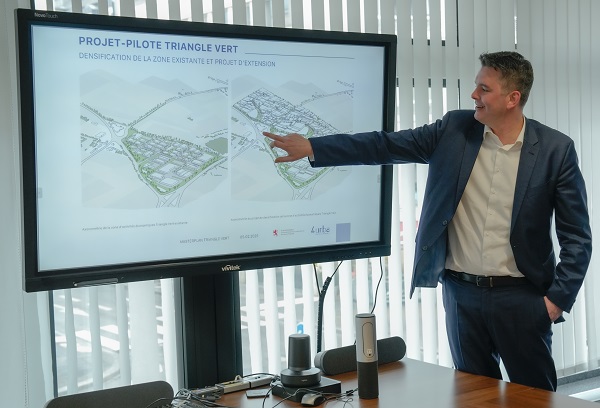 Lex Delles, Luxembourg's Minister of the Economy, SMEs, Energy and Tourism;
Credit: MECO
Lex Delles, Luxembourg's Minister of the Economy, SMEs, Energy and Tourism;
Credit: MECO
On Wednesday 5 February 2025, Luxembourg's Minister of the Economy, SMEs, Energy and Tourism, Lex Delles, accompanied by Steve Reckel, Mayor of Mondorf-les-Bains and President of the SIAER inter-municipal union, and Michel Gloden, Mayor of Schengen and Vice-President of SIAER, presented the concept of the densification of economic activity areas based on the pilot project at the "Green Triangle" (Triangle Vert) business park in Ellange-Gare.
As reported by Luxembourg's Ministry of the Economy, this pilot project is innovative in the field of urban and architectural planning of economic activity areas in Luxembourg; it aims to optimise the use of resources, particularly land, through the horizontal and vertical densification of buildings in order to offer more space to industrial, craft and service companies and to support the development of the economy and employment.
Faced with the scarcity of available land and the challenges related to sustainable urbanisation, the Green Triangle pilot project explores new solutions to maximise the use of existing surfaces while integrating principles of circularity and pooling of infrastructure and services.
The ministry added that it provides in particular:
- increased densification, by optimising built surfaces both horizontally and vertically, making it possible to accommodate more companies and employees on the same surface area;
- increased diversity of economic activities, including spaces dedicated to innovation, business accommodation and research and development;
- the pooling of infrastructure and services, with the establishment of central car parks, catering and coworking spaces, as well as renewable energy solutions (wind turbines, centralised biogas heating);
- an optimised ecological and landscaping development, with integrated green spaces, centralised management of biodiversity and recreational areas, expected to improve the quality of life of users;
- a reflection on housing in order to offer employees in economic activity areas the possibility of housing close to their work.
The objective of this pilot project is also to draw lessons for the future densification of all economic activity areas in the country.
Minister Delles explained: "Optimising resources in our economic activity areas is a key issue for the development of a resilient and attractive national economy. We must reconcile the scarcity of land with the need for sustainable economic development. The 'Green Triangle' pilot project will allow us to experiment with innovative solutions that can be applied on a national scale, in order to accommodate more businesses, support job creation and encourage synergies between economic players. This is a first step towards a more efficient and resilient use of our resources that illustrates our commitment to making our business areas more attractive, more effective and better adapted to the needs of businesses."
"The densification of the 'Green Triangle' will ultimately free up areas for housing in the core of the municipality of Mondorf-les-Bains, currently occupied by economic players," added Steve Reckel. "The public treasury, the employment market, economic development and housing will all benefit from densification. The project to densify the existing economic activity area, in parallel with the development of the extension of the 'Green Triangle', will create interesting synergies in terms of infrastructure and services (e.g. centralised parking silos, catering, waste management) to be implemented and, in doing so, to enhance the existing situation."
Michel Gloden commented: "With the densification of the extension of the 'Green Triangle', the municipality of Schengen will be a pioneer in a concept that will characterise the image of economic activity areas in the decades to come. The projects to extend and densify the 'Green Triangle' will also contribute to the policy of decentralising jobs and will make it possible to bring home-work distances closer together."
In the same context, Albert Waaijenberg, President of the ZARW (Wiltz economic activity area) union, has developed the densification initiatives of the "Salzbaach" in Wiltz. He explained: "The ZARW demonstrates that even with difficult topographical conditions, the concept of densification makes it possible to contribute substantially to economic development compared to the old concepts of development of economic activity areas."








